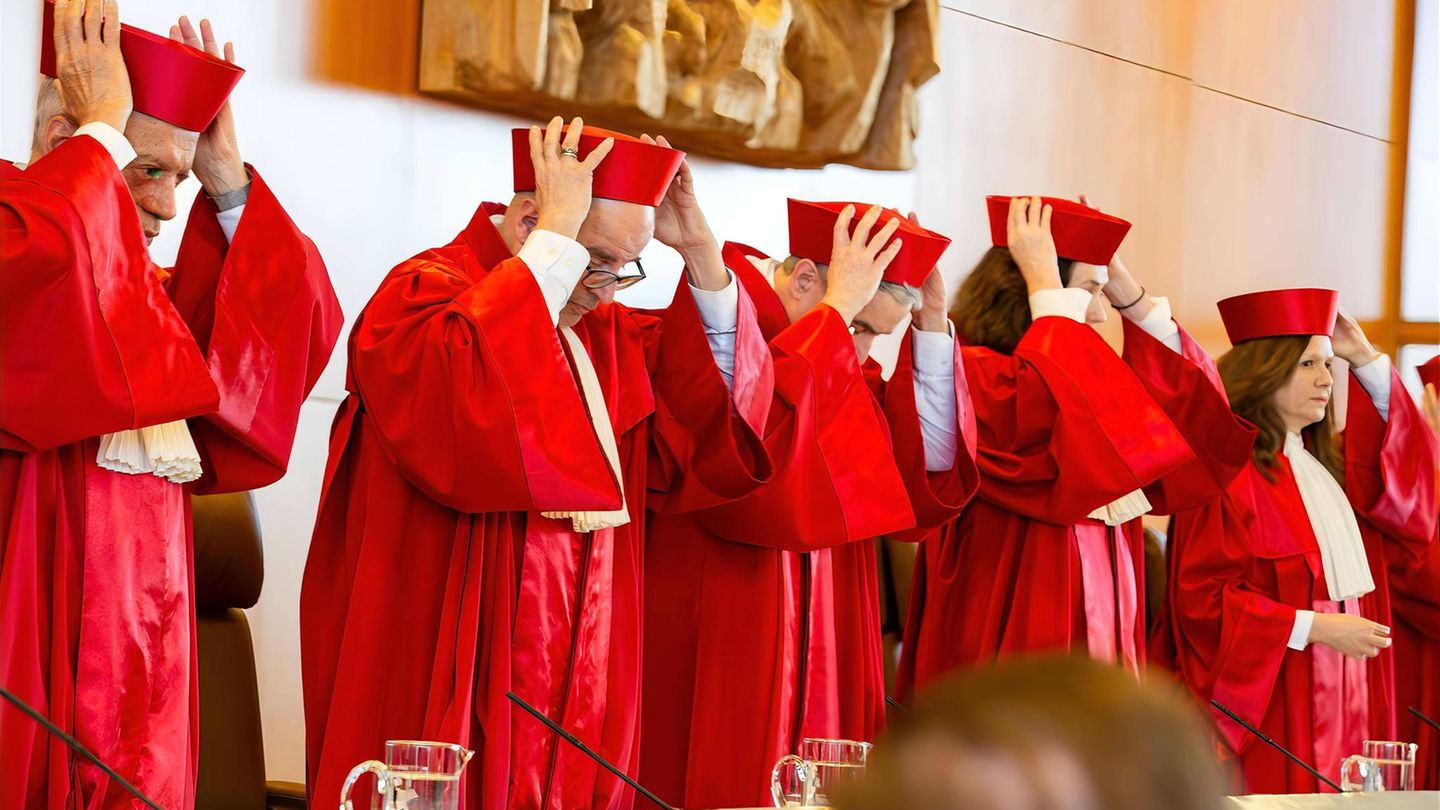Federal Constitutional Court
How the judge’s election works and what it could mean
Copy the current link
Add to the memorial list
There are currently three open judge posts at the Federal Constitutional Court in Karlsruhe. Their replicas could develop into a political issue – threatens the coalition noise?
After days of discussion, the time should be ready: the Bundestag decides on the new appointment of three judges’ positions at the Federal Constitutional Court. What should actually be a routine decision this time triggered a double controversy.
The CDU/CSU candidate could possibly be dependent on votes from the AfD for his choice. And at least some of the Union MPs do not consider one of the two SPD candidates to be voted-if they fail if they fail, the coalition noise would be foreseeable.
How the judge elections take place
The elections are secret. The MPs appear individually in voting booths and throw their voice cards in urns. In the meantime, the next debate begins. The result is announced in the course of the other agenda items, for which they are briefly interrupted. JA votes, no votes and abstentions are communicated. Which faction has coordinated how can only be derived from public statements on the side.
Shortly after 10 a.m., the MPs should initially decide on the Union’s candidate, Günter Spinner. The votes on the two SPD candidates Ann-Katrin Kaufhold and Frauke Brosius-Gersdorf are planned for noon. They should be coordinated separately.
Against Brosius-Gersdorf there are reservations in the Union, among other things because it spoke out in Corona pandemic for an obligation to vaccinate and some of the Union MPs are too liberal in abortion issues. The President of the Central Committee of German Catholics, Irme Stetter-Karp, told the Editorial Network Germany (RND): “I would not be able to choose because of this position.”
A two -thirds majority of the votes cast is necessary. If all 630 MPs were present, this would correspond to 420 votes. However, some parliamentarians are always prevented. In order to be elected, a candidate also needs the majority of the votes of the Bundestag members, i.e. at least 316.
Why it could depend on the AfD
If all factions are represented according to their relative strength, the voices of the three government parties CDU, CSU and SPD as well as the Greens are not sufficient for a two -thirds majority. It would then need votes from the AfD or the left. The CDU/CSU parliamentary group rejects cooperation with both the left and the AfD.
In any case, the AfD parliamentary group top recommended its members to vote for the Union candidate. AfD parliamentary group leader Alice Weidel, on the other hand, rejects the two SPD candidates.
Which majorities would be possible
Union candidate Spinner can hope for the votes of Union, SPD and Greens. If all three factions vote for him, if all MPs were present, only a very thin seven votes would be missing from the two -thirds majority. If these factions are disproportionately represented in the vote, it could be enough. If not, then the question arises whether part of the Left Group Spinner gives your voice. Otherwise AfD votes could be decisive in the end. The other parties in the Bundestag actually want to avoid such dependencies.
If all factions are represented according to their relative strength and the SPD, Greens and the left are closed for the two SPD candidates and the AfD against it, then the votes of almost three quarters of the Union faction are still needed to achieve the necessary two-thirds majority.
What the left wants
The left wants to be included and asked the Union talks before the election. In the long run, the faction also wants to be able to make suggestions for the future occupation of judge positions.
According to the previous agreement in the Bundestag, the Union, SPD and Green judge candidates can propose. These must first be confirmed in the election committee.
What happens if the necessary majority lack
If the necessary two -thirds majority for one or more candidates does not come about, the Federal Council can decide. This can decide over half of the judges in every Senate of the Federal Constitutional Court anyway, and there are more in this case. In addition, however, it would only come at the end of a longer procedure with several stages.
For the black and red coalition, the embarrassment would be if it has to give up so important decisions. Chancellor Friedrich Merz (CDU) said: “I hope that the German Bundestag proves to be decisive.” Bundestag president Julia Klöckner (CDU) also expressed the expectation that the choice “without complaint” will take place in the “Playbook ” of “Politico”. At the same time, she warned not to leave the decision to the Federal Council.
What the decision for the Federal Constitutional Court means
The Federal Constitutional Court is the highest German court and, with its decisions, can sometimes influence the country’s course. This happened, for example, in 2021, when the judges obliged politics to make more efforts on climate protection in order to protect the freedom rights of future generations. The climate protection law was then tightened.
The Federal Constitutional Court consists of 16 judges. Eight judges each form a Senate. Your term is twelve years, you have to be at least 40 and may be 68 years old.
Dpa
YKS / Martina Herzog
Source: Stern
I have been working in the news industry for over 6 years, first as a reporter and now as an editor. I have covered politics extensively, and my work has appeared in major newspapers and online news outlets around the world. In addition to my writing, I also contribute regularly to 24 Hours World.




